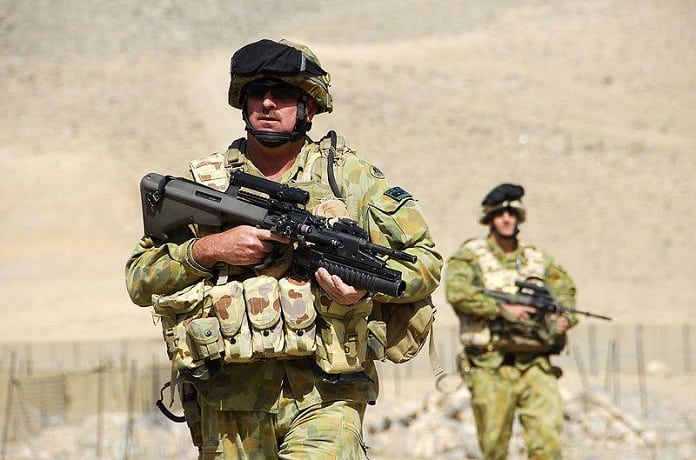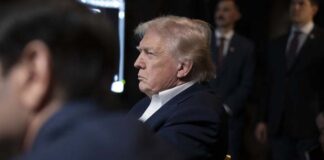Ruby Wawn argues that the Australian government is not surrendering sovereignty to the US through the nuclear subs pact but pursuing its own imperialist interests
Scott Morrison’s new AUKUS alliance and the move to acquire nuclear submarines takes Australia further into aggressive military confrontation with China.
Some on the left have called the deal a “blow to Australian sovereignty” and independence.
Former Labor Prime Minister Paul Keating used an opinion piece in the Sydney Morning Herald to criticise Morrison for doing “the bidding of another great power” and surrendering “Australia’s sovereignty by locking the country and its military forces into the force structure of the United States”.
This echoes a long-running idea that Australia acts as a lackey of the US, with Australia joining US wars in Vietnam, Afghanistan and Iraq instead of standing up for Australia’s interests. But in fact Australia has often been more aggressively militaristic than the US, with Australian governments seeing the alliance as a way of asserting Australia’s own imperialist interests.
Nuclear subs deal
The nuclear submarines deal, far from being pushed on Australia by the US, was driven by the Australian government.
The plan was 18 months in the making, after Morrison first raised the idea of nuclear submarines with the Department of Defence in early 2020.
While previous Liberal leaders, including Tony Abbott, had toyed with the idea of nuclear submarines, Morrison set the wheels in motion by ordering a discussion paper and the formation of a secret taskforce to explore the feasibility of acquiring the technology.
As The Guardian reported, “British sources said the conversations about the nuclear power deal were initiated by the Australians in March.” Morrison first spoke to British Prime Minister Boris Johnson, gaining his support, and the pair then raised the plan with US President Joe Biden on the sidelines of the G7 meeting in June.
The deal will see Australia gain at least eight nuclear-powered submarines, becoming the seventh nation with nuclear submarines and only the second in history, after Britain, to gain access to US nuclear technology.
Australia will also acquire long range missiles, unmanned underwater vehicles and more US troops joining the 2500 already stationed at US bases on Australian soil.
Morrison claims that Australia will also need to spend more on defence as part of the new partnership. The 2021 Defence budget is already at $44.62 billion, a 15 per cent jump on last year.
AUKUS, a trilateral security partnership with the US and UK, is aimed squarely against China.
While none of the three AUKUS leaders mentioned China at their press conference, it is clear the “new challenges” Morrison referred to meant China and the threat it poses to US dominance in the region.
Australian imperialism
The enthusiasm for a military partnership with two of the largest militaries in the world continues the pattern of Australian imperialism asserting its own interests in the region with the backing of the dominant global power.
Australian imperialism in the Pacific dates back to the emergence of an Australian ruling class in the 1850s that looked to grab control of resources, trade and investment.
In the late 1800s, Australia repeatedly pressured Britain to seize control of islands in the Pacific, including Fiji, Vanuatu and New Guinea. Following the First World War it colonised Papua New Guinea and Nauru.
Its sole interest was to exploit the resources and labour of the Pacific Islands, and keep other powers out of the South Pacific.
Initially the colonies turned to Britain to safeguard these interests. But Australian and British interests were not always identical. Britain, with global interests, often saw the demands of the Australian colonies to acquire more South Pacific territories as a nuisance. On several occasions, most dramatically over New Guinea, the Australian colonies took action to force Britain to seize more territory.
After the Second World War, as British imperialism declined and a much more powerful player emerged, Australia turned to the US to ensure its control over the region.
While Australia’s military spending far outstrips any of the small Pacific islands or nearby countries like Indonesia, Papua New Guinea, Malaysia or the Philippines, Australia is no match against a major power like China, which has produced more ships, submarines, aircraft and missiles than any other country in the last 20 years.
In order to ensure regional dominance in the South Pacific and global influence out of proportion to its size, Australia’s rulers have worked to strengthen Washington’s commitment to security in the region. Australia’s strategy of keeping a powerful friend to ensure its defence has seen it follow the US into every major military war they’ve launched since 1945.
Turmoil
In the late 1990s, Australia’s backyard in the Pacific was in turmoil. Suharto’s regime in Indonesia had fallen, with Australia launching military action in East Timor. By 2001, Australia held growing concerns over an “arc of instability” in the Pacific.
But the US had decided that Indonesia “was not as strategically important”, prompting Defence to call for a massive increase in the military budget, and the Australian government concerned that it needed to pull the US further into the region to ensuring its own influence.
So when US President George Bush invaded Afghanistan and then Iraq, launching a “war on terror”, then Prime Minister John Howard invoked the ANZUS Treaty and enthusiastically committed troops. Far from simply doing the US’s bidding, Australian troops were dispatched in the hopes of bolstering the US-Australia alliance, in the hope of securing a more sympathetic ear when Australian interests were on the line. “We are paying our dues now, in case we require American assistance in the future”, explained military expert Paul Dibb.
The US invasion of Iraq and efforts to control its oil resources also benefited Australian capitalism with Australian oil companies’ profits rising.
Australia is a significant regional player and an imperialist power in its own right. Its alliances with the US and UK are designed to serve those interests.
Seeing them as a threat to “Australian sovereignty” misunderstands why Australia’s rulers want to tie themselves to the US. It also feeds the “left nationalist” idea that Australian nationalism could somehow be a progressive force, if Australia was more “independent” of the US.
This view makes left nationalists sympathetic to the establishment figures who have criticised the AUKUS alliance in similar terms. In addition to Paul Keating, another who wants Australia to distance itself from the US is former Defence Department official Hugh White. He argues that, to avoid war with China, Australia should significantly increase defence spending and consider acquiring nuclear missiles.
This is not an anti-war position. It means pouring millions more into weapons that could be funding schools, hospitals and a climate transition. Support for such figures from the left can only undermine the struggle against militarism and war.
The interests of Australian capitalism mean that Australian nationalism and foreign policy will always serve the Australian ruling class’ efforts to dominate the region and defend their profits. Left nationalism can only mean accepting these aims.
China
In the last decade, Australian governments have become increasingly focused on the rise of China.
While the mainstream media paints China as the aggressor, the Australian government’s actions have been just as belligerent.
Senior officials and Defence Minister Peter Dutton have been fuelling the possibility of military confrontation, claiming Australia is “already under attack” and that the possibility of a Chinese attack on Taiwan “should not be discounted”.
Former Prime Minister Tony Abbott even used a speech in Taiwan in October to suggest China could “lash out disastrously very soon” under the “cult of the new red emperor”.
China’s fast growing economy, military expansion and interest in the Pacific make it a threat both to Australia’s regional dominance and the US-dominated system of trade and alliances that benefit Australia.
Australian influence in the south Pacific still far eclipses that of China. Australia is by far the largest aid giver in the Pacific, providing $864 million in aid this year. By comparison China’s aid in the region is actually shrinking, spending $169 million in 2019 down from $246 million in 2018.
And as COVID ravages the Pacific, vaccine imperialism has seen Australia provide 600,000 vaccine doses to the region, while China has provided 300,000 doses of its Sinopharm vaccine.
For the Australian ruling class, keeping rival powers out of the region and maintaining the current “rules based system” of global trade is essential for its military and economic interests.
China is Australia’s largest trading partner, accounting for nearly a third of Australia’s global trade. In 2020 alone we exported $159 billion in goods and services to China.
As an export based economy, Australia is reliant on global trade arrangements but it wants the US to set the terms of trade. Maintaining US hegemony gives Australia a seat at the table.
In a more regionally divided world Australia’s rulers fear they won’t have the weight to push back against what the G7 describes as China’s “non-market policies and practices”.
These aims are outlined in the Australian government’s 2016 Defence White Paper, which lists “challenges to the stability of the rules-based global order, including competition between countries and major powers trying to promote their interests outside of the established rules” as a key concern.
It concludes that, “The global strategic and economic weight of the United States will be essential to the continued stability of the rules-based global order on which Australia relies for our security and prosperity.”
China threatens to challenge this status quo and the Western powers are prepared to throw around their military might to stop it.
For the left the main enemy is at home. Ordinary working class Australians have no interest in waging war against China or spending billions of dollars to acquire nuclear technologies.
We need to oppose AUKUS and Australia’s military buildup as well as the drive to war.






